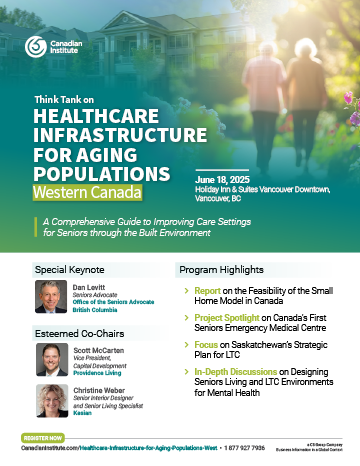Agenda

Flip through our conference brochure and discover what’s new this year.
Download Brochure
Day 1
June 18, 2025
Registration Opens and Breakfast is Served
Keynote
The Future of Seniors Care in BC: Exploring Opportunities to Improve Infrastructure for Aging Populations

Dan LevittSeniors AdvocateOffice of the Seniors Advocate British Columbia

Dr. Samir K. Sinha, MD, DPhil, FRCPC, FRSM, FCAHS, AGSFGeriatrician and Clinician Scientist
Sinai Health System and University Health NetworkDirector of Health Policy Research, National Institute on Ageing
The pandemic put a spotlight on weak links in Canada’s Long-Term Care System—from care models to physical environments that were not conducive to health, safety or wellbeing. This sparked conversations about how to support the creation of more small care home settings.
In 2022 the CSA released a new standard that specifically recommends this approach. Since that time examples of the model have emerged in Canada, but it is still not the model of choice for many provinces who are up against a fast-changing demographic. This session will provide insights on the current LTC landscape and the feasibility of the small care home model.
- Analyzing current challenges within Canada’s LTC system
- Describing the small care home model
- Examining the relationship between resident centred care and the built environment
- Providing examples of the small care model LTC in Canada and other jurisdictions
- Measuring the impact of this model on residents, caregivers and staff
- Identifying the barriers to moving away from institutional, traditional models in favour of implementing the small home model
- Exploring what would enable this model to succeed in the Canadian context
Morning Coffee Break
Engaging the Resident Voice in Long-Term Care: A Resident and Family Council Perspective on doing more with what we already have– Our Voice!

Lisa DawsonVPIndependent Long-Term Care Councils Association of BC
From admission, to recreational activities, to food and dining experience, there is no better way for care homes to elevate their service than asking their clientele. What are the benefits of resident and family councils you ask?
For the Resident and Family – gives them a voice in their own lived experience and future care.
Councils support open dialogue, friendship, education, information sharing and idea generation to contribute to continuous quality improvement in their care home. For the care home community – Councils offer a “community” feel to the care home upon admission. They are a mechanism for respectful and collaborative communication which supports the necessary input and feedback care homes need to make effective decisions.
This session will identify current gaps in our model of long-term care and how, through regular and ongoing dialogue and support of councils, long-term care homes can make a difference for the whole care home community.

Shary AdamsHealthcare Practice Area LeaderGensler

Lia TsotsosDirector, of the Centre for Elder ResearchSheridan College
Networking Lunch
Spotlight on Providence Living at The Views
An Innovative LTC Model Inspired by the Dementia Village: Sharing Project Insights and Lessons Learned for Future Builds

Scott McCartenVice President, Capital DevelopmentProvidence Living
This session will tour the design of Canada’s first publicly funded Long Term Care home built on the principles of a Dementia village, and explore how the design was conceived to support a novel model of care called “Home for Us”, which is a new social relational model of care intended to inject autonomy and purpose into resident lives.
Lessons learned and innovations will be highlighted, and their application to Providence Living’s next project in Prince George BC will be explored in the context of a Prince George project tour.
Canada’s First Dedicated Seniors Emergency Medical Centre: Improving the Healthcare Experience for Older Adults through the Built Environment

Lisa TobinPrincipalCumulus Architects Inc
This session will put a spotlight on the Myrna Daniels Seniors Medicine Centre in Toronto. A first of its kind in Canada, this centre is being designed to improve the emergency care experience for older adults with complex care needs. This session will delve in to how the built environment will help support this mission.
- Understanding how seniors experience healthcare settings and the challenges that can arise
- Detailing the research and engagement process that informed the design of the emergency department
- Addressing seniors’ unique needs (as it relates to hearing, vision, mobility, cognitive considerations) through design elements
- Improving safety through fixu
- Creating an environment that promotes calm and wellbeing through biophilic imagery


